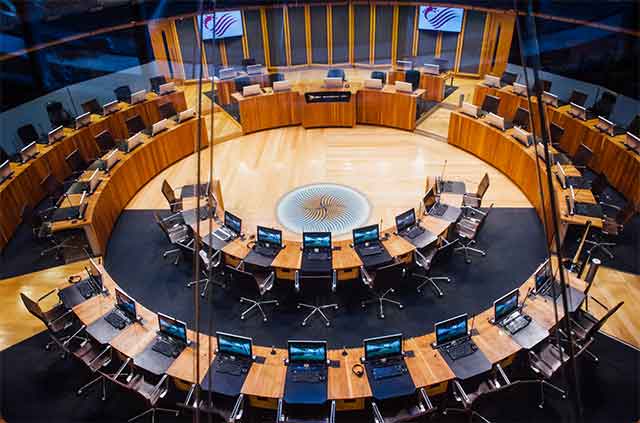Plans to introduce gender quotas in Senedd elections moved a step closer amid concerns the bill is “highly likely” to be challenged in the Supreme Court.
Senedd members agreed the general principles of the gender quotas bill, which would require at least half of a political party’s candidates to be women.
Jane Hutt reiterated her position Wales has the necessary powers to pass the bill but confirmed implementation would be delayed until the 2030 election.
She said the plans were pushed back due to concerns about the potential impact of legal challenges on the conduct and outcome of the 2026 election.
Ms Hutt, who is in charge of the bill, said the landmark legislation would make the Senedd more effective as well as more reflective of the people it serves.
Section 109
Adam Price, who represents Carmarthen East and Dinefwr, urged the Welsh Government to work with Labour colleagues in Westminster to grant Wales the required powers.
The former Plaid Cymru leader said an order – under section 109 of the 2006 Government of Wales Act – could bring the bill within the Welsh Parliament’s scope.
Mr Price argued a section 109 order would take the reasons the Welsh Government has given for delaying implementation to 2030 off the table completely.
He asked: “Why couldn’t we apply for that order in council today, from a Labour government at Westminster, so that we can have a gender-balanced parliament in 2026?”
Ms Hutt replied that a section 109 order would not put the question of whether the Senedd has powers beyond doubt, nor remove the risk of referral to the Supreme Court.
‘Open to abuse’
David Rees, who chaired the Senedd reform committee tasked with scrutinising the bill, raised witnesses’ concerns that gender quotas could be susceptible to abuse.
He reiterated calls for any false statement on nomination forms to be an electoral offence, a committee recommendation that was rejected by the Welsh Government.
The Labour backbencher said the committee heard conflicting views on whether the Senedd has the necessary powers but most evidence from legal advisers suggested it does not.
In a letter to MSs when the bill was introduced in March, Elin Jones explained her position that the bill relates to a reserved matter and is not within the Senedd’s powers.
The Senedd’s speaker or Llywydd said her view was based on legal tests and advice as she stressed that the question can only be definitely answered by the Supreme Court.
‘Blank cheque’
Mike Hedges, chair of the Senedd legislation committee, warned the bill could give the Welsh Government a “blank cheque” to legislate on some electoral matters.
Outlining his committee’s recommendations, he raised concern about the balance between the details in the bill itself and those that will be left to subordinate legislation.
Mr Hedges, a Labour backbencher who represents Swansea East, was disappointed by a decision to curtail scrutiny of the bill – only for the “stage-one” debate to be delayed.
Peredur Owen Griffiths, who chairs the finance committee, raised concerns about the unquantified cost of the bill being referred to the Supreme Court.
The Plaid Cymru politician pointed out that this is the first time the Llywydd has issued a statement that a bill would not be within powers.
‘Wrong’
Darren Millar, for the Conservatives, opposed the bill and the principle of gender quotas, arguing the proposed system is neither proportionate nor appropriate.
He said the reform committee heard the bill is highly likely to be challenged in the courts.
The Tory told the Senedd the bill bears little resemblance to the initial plan for gender-zipped lists which was “hatched” in a Labour-Plaid Cymru agreement.
He said the system would allow political parties to put forward lists of candidates that could be 100% female but only a maximum of up to 50% male.
Mr Millar, who represents Clwyd West, warned the bill pits one aspect of diversity, gender, against others “which are completely ignored” such as disability, age, faith and race.
‘Barriers’
Heledd Fychan, for Plaid Cymru, told the chamber gender equality is vital for a healthy and functioning democracy, expressing disappointment at the delay.
Picking up on comments from Mr Millar about people being elected on merit, the South Wales Central representative said: “We are not in an equal society; there are so many barriers that stop women from being able to be appointed to a myriad of different roles.”
Ms Fychan said the problem is not unique to Wales, with only six countries having a 50% or higher proportion of women in their parliaments.
“At the current rate … gender parity won’t be achieved globally until 2063 at the earliest,” she said, adding that female politicians face terrifying levels of hate, sexism and harassment.
Ms Fychan called on the Welsh Government to unequivocally demand the relevant powers.
‘Weak’
Carolyn Thomas, a Labour backbencher who represents North Wales, said she once believed in meritocracy but she has experienced unconscious bias “time and time again”.
Rhys ab Owen, an ex-barrister who sits as an independent, raised concerns about “weak” wording, such as the use of “may” rather than “must” in section 71 of the bill.
Ms Hutt, who is chief whip and Trefnydd, the Welsh Government’s business manager, said ministers are considering the section 109 route but she stressed it is not straightforward.
Following the July 16 debate, MSs voted 39-14 in favour of the general principles of the bill, which now moves to the first amending phase in the Senedd’s four-stage legislative process.
If passed, the counsel general or attorney general – the Welsh and UK Government’s chief legal advisers, respectively – have four weeks to refer the bill to the Supreme Court.

